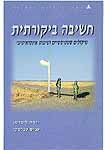|
Discipline: Social
Sciences
Topic: Psychology / Management
Critical Thinking: Statistical Reasoning and Intuitive Judgment
|
Varda Liberman and
Amos Tversky
|

|
This book traces the patterns of decision-making
common to humankind, psychological mechanisms that govern thought patterns,
the tools generally used to evaluate outcomes intuitively, errors in
calculation, factors that influence judgment and deviance from statistical
likelihood. Taking all these factors together, the authors have painted a
picture of why faulty judgment and miscalculation are so common – in
professional evaluation, in business, in gambling, in risk-taking in
general and in practically every walk of life.
|
|
Designed to provide
students with basic tools for critical thinking which will help them to become
intelligent information consumers, the book is a required textbook in all
universities in Israel, both in economics and psychology.
The book presents concepts in statistics and
relevant methodological considerations (such as control groups, sampling
errors, central tendency, calibration) along with psychological mechanisms
(such as representativeness, availability and
anchoring), which human beings tend to use to intuitively evaluate
information. It focuses on issues in which intuitive impressions which do
not coincide with statistical considerations often result in systematic
biases such as gambler’s fallacy, over-confidence, spurious correlation,
and non-regressive prediction.
1996, 360 pp., cat # 10145
|
|
|
Dr. Varda Liberman is Vice Dean of the Arison
School of Business and Director of Mathematical and Statistical Studies at
Interdisciplinary Center, Herzliya. She has
published several textbooks in mathematics and statistics.
|
|
|
The late Amos Tversky was Professor of Behavioral Sciences at Stanford
University and a long-time collaborator of Nobel Prize laureate Daniel Kahneman. Together, they originated prospect theory to
explain irrational human economic choices, for which Kahneman
received the 2002 Nobel Prize. Together with Kahneman
and Paul Slovic, he edited Judgment under
Uncertainty: Heuristics and Biases (Cambridge University Press, 1982),
and with Kahneman, he edited Choices, Values,
and Frames (Cambridge University Press, 2000). Recently MIT Press
published his selected works: Preference, Belief, and Similarity:
Selected Writings (2003), edited by Eldar Shafir.
|

For additional
information, contact the Rights and
Permissions Department.
|